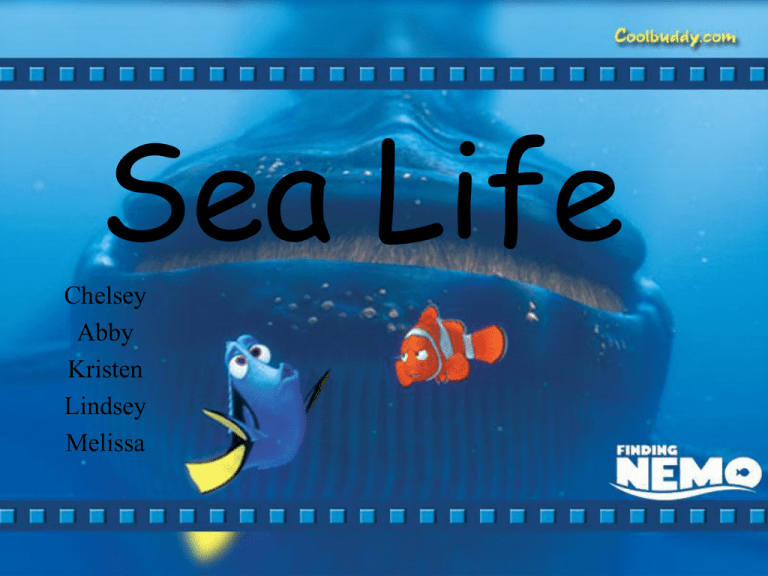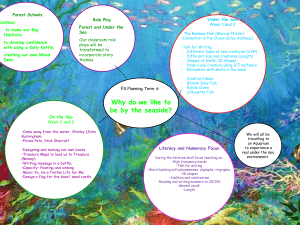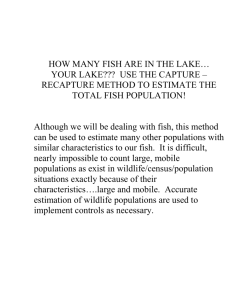Sea Life
advertisement

Sea Life Chelsey Abby Kristen Lindsey Melissa Justification • • • • Fascinating for all ages Opens eyes to the immense world Sea life is often overlooked. Kids of all ages are interested in “Finding Nemo” at the present time. • Students in Illinois are not exposed to the environment under the sea. Abby’s Lesson • Read story A Fishy Story Students will brainstorm what they might want to write a short story about regarding sea life. • Show example of “Fin Tales” activity to students. • Allow students to brainstorm story ideas while teacher writes them on the chalkboard. Have students practice writing out their sentences to make a story on sea life lined paper. • Have students re-copy sentences on sentence slips and put their fish together. • Allow students to color their fish while others are finishing up. Lindsey’s Lesson Explain to the students that they are to complete an interactive presentation with a partner. Divide students into pairs and hand out the All About Fish worksheet. Model how to access the PowerPoint presentation and look for the information. Have pairs complete the interactive presentation and worksheet. Review what they learned about fish. • As a class, complete a Venn diagram comparing and contrasting humans and fish. Kristen’s Lesson • • • • • • • • • • Read students Leo Lionni’s book entitled, Swimming. Have students close their eyes and imaging an underwater scene. Tell them to provide some words from their image. Put words on the chalkboard, overhead, etc. for the entire class to see. Allow students to color their fish while others are finishing up. After going through the work bank the children created, tell the students that they are to incorporate five words or more into an under the sea scene that they will create. Have numerous different colors of construction paper at the front of the class. Tell the students that they are to take as many colors as they want to make their sea scene. Once the children retrieve their paper, explain to them that they are to tear off small pieces of the colored construction paper and paste them all together to make a larger image. After the children are done making their under the sea scene with paper scraps, ask them to write a paragraph about the scene that they created. They have to incorporate all of the words they chose in their scene into their paragraph. Ask the class to share both pieces of work. Chelsey’s Lesson Students will create have created a treasure box at the beginning of the year. A treasure theme will be used in the room throughout the year. Students will read a chapter of Treasure Island every two days. Students will discuss, in class, what they have read. Every other day a small reenactment of the chapter will be performed. Students will discuss possible themes. There will be daily outlines that the class does as a whole. Students will have to look up new words because they will be quizzed on vocabulary words that are in the text. When the unit is over, there will be a treasure Hunt There will be clues leading to the boxes buried at the beginning of the year. Melissa’s Lesson Have students read textbook chapter. Then assign definitions and discuss what each word means as a class. Before a quiz on these definitions, introduce a fun activity to help students with their definitions. Pass out fish markers with the instructions that they are not allowed to eat anything until the activity is finished. Then pass out worksheets. Mix up definitions and read aloud to the class until someone has 5 definitions in a row. Play until time runs out for this activity. Review definitions while students are snacking on their fish. Our Group Lesson Read students The Rainbow Fish by Marcus Pfister. Upon finishing the book, tell the students that they are going to write their own story about their favorite sea animal. Use an overhead in front of the entire class that has every letter in the alphabet in its own box. Ask the class to generate words (2-5) that begin with each of the letters and write them in the coordinating boxes. Leave the word chart up on the overhead and hand out the story worksheet. Explain to the students that they have to come up with their own scary, funny, silly, etc. sea creature story. One complete sentence should be written after each letter. The sentences cannot be continued down to the next line. Every sentence starts with a word that coordinates with the letter at the beginning of the line. Give students ample time to complete his/her story and allow them to share with the class if they chose to. Do you have a larger word bank to pull starter words from after this assignment? Why was writing this story hard? Books from Genres • (Contemporary Realistic Fiction) Amos, William H. Exploring the Seashore. National Geographic Society.Two children are captured on camera by the National Geographic team as they explore the sea life at the shore of the water. The children encounter many different types of sea life as they peruse the coastline. Bird, crabs, sea urchins and many more sea creatures are examined. • (Modern Fantasy) Applegate, K. A. (1996). The Message: Animorphs. NewYork: Scholastic. A girl with the magical ability to morph into a dolphin gets into trouble during an adventure. She is helped by her magical friends to help save an Andalite from the Yeerks. Both creatures are extraterrestrial and they have brought their civil war to planet Earth. Books from Genres Cont. • (Traditional Fantasy) Baker, Margaret and Mary (1951). The Golden Books Treasury of Elves and Fairies: The Lost Merbaby. New York, New York: Golden Books Publishing Company, Inc. Three Mermaids search for their missing merbaby, who has been rescued by a fisherman and his wife. They enlist the help of a myriad of sea creatures and learn that family is more important than keeping a house clean and tidy. • (Poetry/Plays) Base, Graeme (1992). The Sign of the Seahorse: A Tale of Greed and High Adventure in Two Acts. New York, New York: Abrams.The inhabitants of a coral reef are threatened when a shady real estate deal started by the greedy Grouper floods their area with poisonous waste. Books from Genres Cont. • Picture Book Canizares, Susan, and Mary Reid. (1998). Coral Reef. New York: Scholastic. A picture book with photographs that have simple text. The book explores life on a coral reef, emphasizing the beautiful colors and patterns found there. Pictures are wonderful and the book does an excellent job of teaching colors through vibrant pictures. • Informational Morris, Rick. (1983). Mysteries and Marvels of Ocean Life. New York: Scholastic. There are many mysteries of ocean life still to be explained and species new to science are being found every year. In this book a reader will learn all about the unusual, the extraordinary and the unexplained fascination of the world with oceans. This informational book is packed with fun facts! Books from Genres Cont. • Biography McGovern, Ann (1998). Adventures of the Shark Lady: Eugenie Clark Around the World. New York: Scholastic. This is the life story of Eugenie Clark, a marine biologist. It chronicles the life and adventure of this very daring and caring woman. • (Historical Fiction) Stevenson, Robert Louis. (1883). Treasure Island. New York: Scholastic. The story is set in the day of the infamous pirate Long John Silver. Jim Hawkins encounters Billy Bones and his adventures begin. The death of Billy Bones, brings Jim into contact with many others. After discovering a treasure map among the belongings of Billy Bones, they sail for this island where it has been discovered that the notorious Captain Flint buried his treasure. Long John Silver, in an attempt to get the treasure, comes on board their ship. Books from Genres Cont. • Multicultural Tooze, Ruth. (1962). Silver from the Sea. New York: Viking Press. This is the story of a Vietnamese boy. It is his first day to go to the silver waters to fish. This is a story of family and determination. The boy learns much from his family and has a successful first day of fishing in the silver waters for silver fish. TIME FOR FUN!



